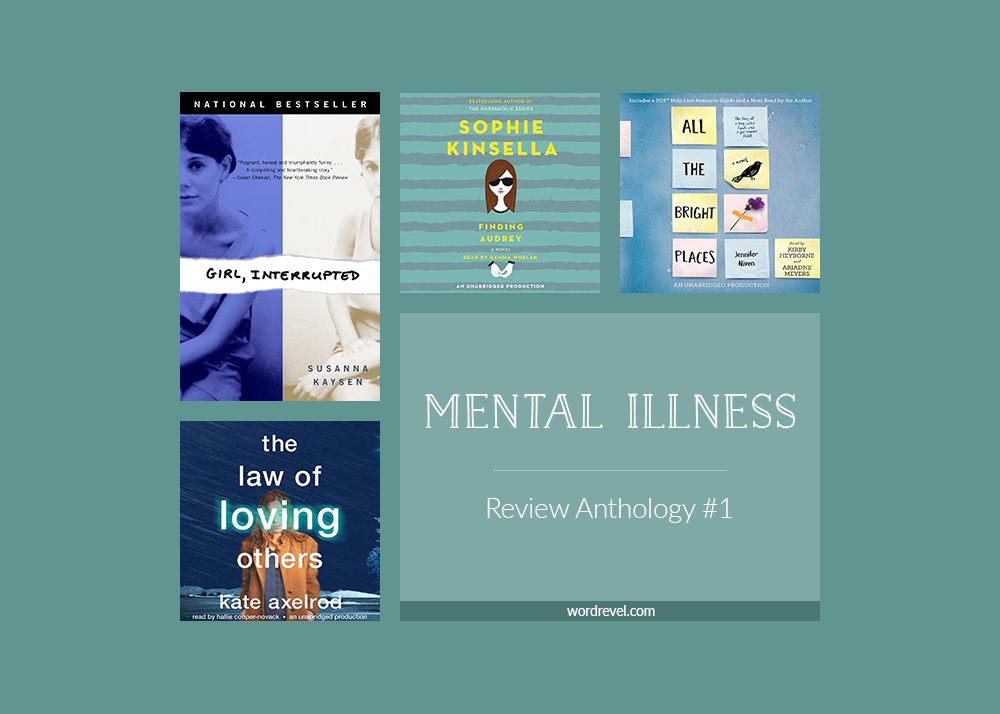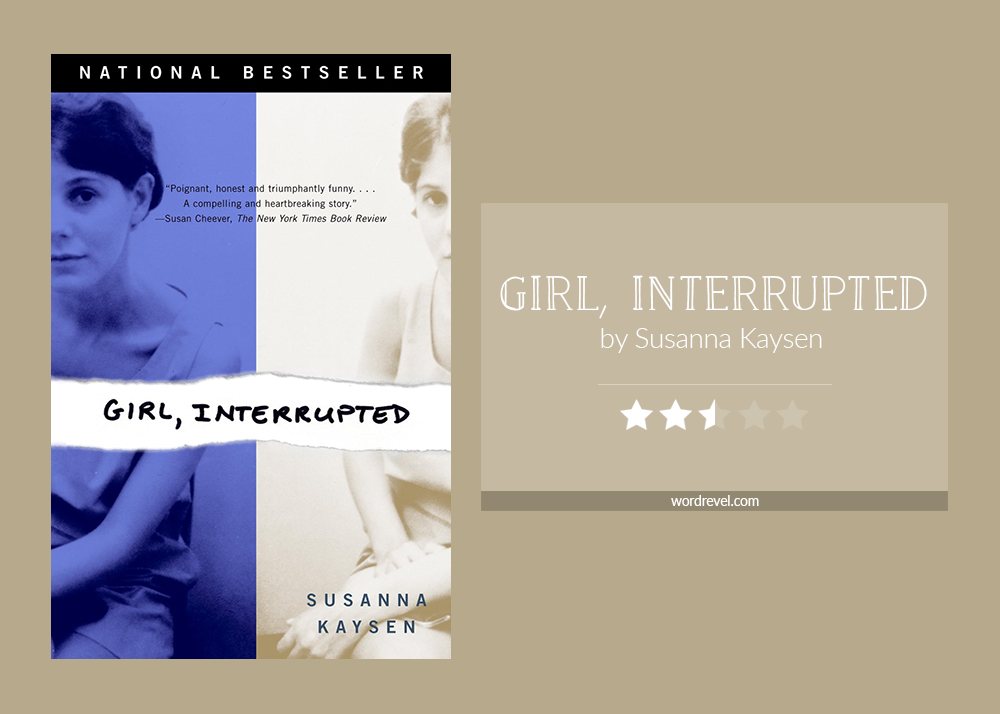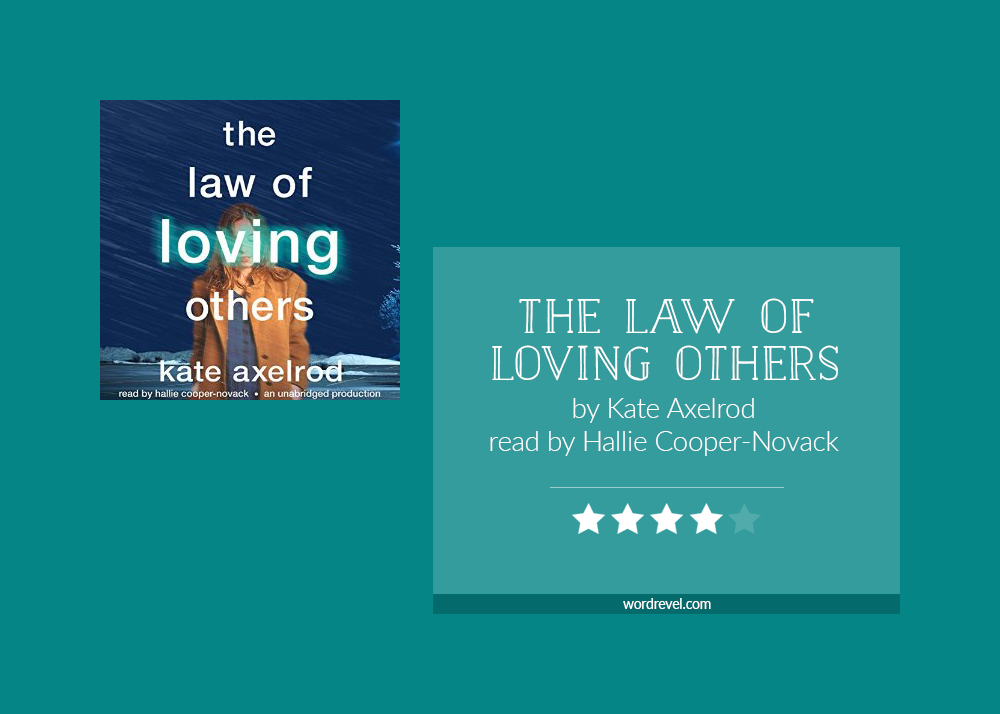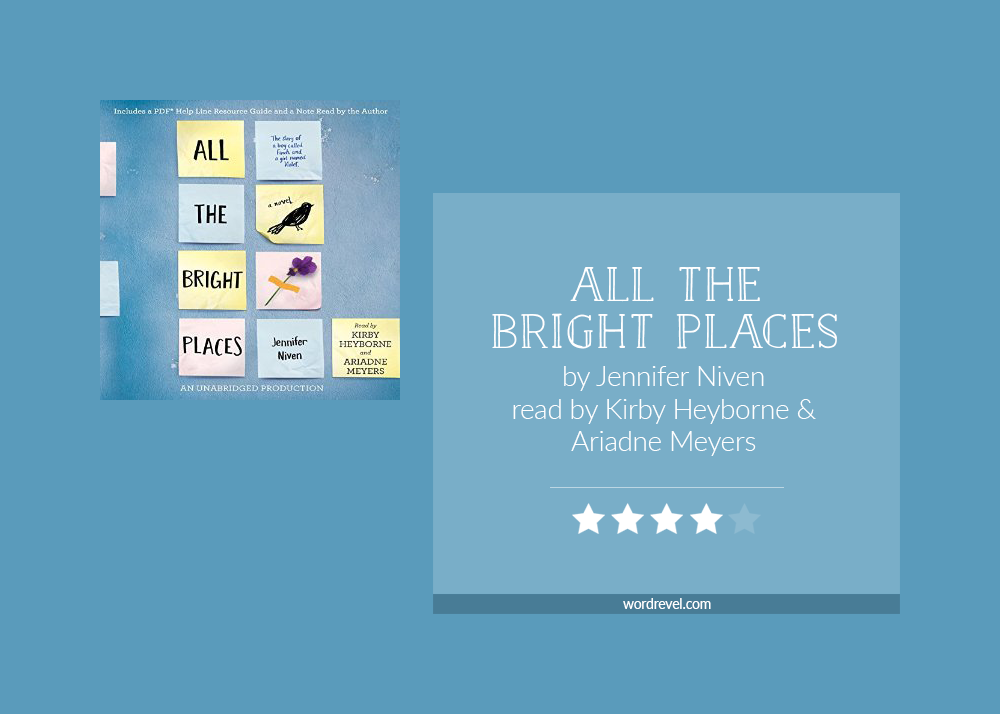
As I browsed through all the titles of books that I read last year, I realized that there were a lot of them that I didn’t share here on the blog (yet). Some of these were books that I thought were fairly important and I always meant to feature.
To make this first anthology of short reviews meaningful, I grouped them thematically. All four books below grapple with tough issues surrounding mental illness. Girl, Interrupted is non-fiction. The rest are fiction.
 Girl, Interrupted by Susanna Kaysen • contains 192 pages • published 1993 by Vintage Books, Random House • classified as Biography • obtained through Overdrive • read as eBook
Girl, Interrupted by Susanna Kaysen • contains 192 pages • published 1993 by Vintage Books, Random House • classified as Biography • obtained through Overdrive • read as eBook Synopsis:
In 1967, after a session with a psychiatrist she'd never seen before, eighteen-year-old Susanna Kaysen was put in a taxi and sent to McLean Hospital. She spent most of the next two years on the ward for teenage girls in a psychiatric hospital as renowned for its famous clientele -- Sylvia Plath, Robert Lowell, James Taylor and Ray Charles.
Given that the author was committed to a psychiatric hospital and Girl, Interrupted is a memoir chronicling that time, I didn’t think the book did it all that much justice. Little was actually shared through the book that an observer couldn’t have written. The advantage of the first-person perspective of someone who actually experienced two years at McLean Hospital didn’t translate.
However, there were explorations on what it means to be mentally ill versus healthy, which against the backdrop of the 1960s did seem pertinent — such as homosexuality no longer being diagnosed as an illness. These sections somewhat made up for the lack of depth conveyed with regards to the actual experiences.
Perhaps the fact that I watched the movie adaptation for a sociology course on medicine and health a couple of years ago affected my expectations a fair bit. After dissecting and analysing the movie, I thought there’d be so much more meat to the primary text. Sadly, that wasn’t the case. I didn’t walk away from the book with the impression that I gained all that much beyond a collection of thoughts on whether diagnoses of the patients were justified in the first place.
 Finding Audrey by Sophie Kinsella • read by Gemma Whelan for 6 hours 36 minutes • published June 9, 2015 by Random House Audio, Random House • classified as Contemporary • obtained through Overdrive
Finding Audrey by Sophie Kinsella • read by Gemma Whelan for 6 hours 36 minutes • published June 9, 2015 by Random House Audio, Random House • classified as Contemporary • obtained through Overdrive Synopsis:
An anxiety disorder disrupts fourteen-year-old Audrey’s daily life. She has been making slow but steady progress with Dr. Sarah, but when Audrey meets Linus, her brother’s gaming teammate, she is energized. She connects with him. Audrey can talk through her fears with Linus in a way she’s never been able to do with anyone before. As their friendship deepens and her recovery gains momentum, a sweet romantic connection develops, one that helps not just Audrey but also her entire family.
On some levels Finding Audrey was amusing. Kinsella has a way of writing very entertainings and I loved the dynamics between Audrey and her brothers. However, combined with the subject matter and the caricatures that some of the characters were and the lack of depth especially in relation to mental illness didn’t sit that well with me. The time frames of some of the events didn’t line up either — first Audrey spent three days in bed, all anxious to face the world and then suddenly she was very gung ho about going out, all because a boy whom she liked coaxed her into it. The whole idea that a romantic interest makes everything all roses and sunshine discounts the complexity of social anxiety disorder of the degree that Audrey was battling with.
 The Law of Loving Others by Kate Axelrod • read by Hallie Cooper-Novack for 6 hours and 8 minutes • published January 8, 2015 by Listening Library • classified as Contemporary • obtained through Scribd • read as audiobook
The Law of Loving Others by Kate Axelrod • read by Hallie Cooper-Novack for 6 hours and 8 minutes • published January 8, 2015 by Listening Library • classified as Contemporary • obtained through Scribd • read as audiobook Synopsis:
Emma returns home from boarding school anticipating a quiet winter break hanging out with friends and taking trips into the city to visit her new boyfriend, Daniel. But when she arrives, she discovers that her mother has been hospitalized after suffering a schizophrenic break--and it's not the first time. Emma's life is immediately thrown into chaos as an ill-equipped Daniel starts to become emotionally distant, and Emma begins to question her own mental health.
Emma spiralled so much out of control that it became an excuse for her to treat people she loved extremely unfairly. In fact, in some cases, she was so out of line, her actions were inexcusable. She knew what she was doing was wrong and yet she continued. At the same time, she was seizing every opportunity she could to self-destruct — physically, mentally and emotionally.
Given her anxiety and worries about her mother as well as her own mental health, I almost understood her. Partly that understanding stems from my own experiences, which in some ways also made me uncomfortable. Emma was a complex character who on the surface seemed very self-absorbed as she tried to hide her inner turmoil.
The Law of Loving Others is probably one of those books that many would find difficult to connect with because of all the flaws. The characters are raw, the plot is bleak and overall, there’s so little happiness to be found. For me, this is precisely why I appreciated this book. It was was real and messy and the MC so torn apart, it reminded me that other people have their own struggles too.
 All the Bright Places by Jennifer Niven • read by Kirby Heyborne, Ariadne Meyers for 11 hours 6 minutes • published January 6, 2015 by Listening Library • classified as Contemporary • obtained through Overdrive, contest • read as audiobook, ARC
All the Bright Places by Jennifer Niven • read by Kirby Heyborne, Ariadne Meyers for 11 hours 6 minutes • published January 6, 2015 by Listening Library • classified as Contemporary • obtained through Overdrive, contest • read as audiobook, ARC Synopsis:
Theodore Finch is fascinated by death, and he constantly thinks of ways he might kill himself. But each time, something good, no matter how small, stops him.
Violet Markey lives for the future, counting the days until graduation, when she can escape her Indiana town and her aching grief in the wake of her sister's recent death. When Finch and Violet meet on the ledge of the bell tower at school, it's unclear who saves whom.
I’m sure many readers have been thinking All the Bright Places reminds them a lot of a certain book. *cough The Fault in Our Stars cough* In some ways, it really does. But in other ways, I thought this book right here had a much better execution with characters I actually believed in and rooted for. Violet and Finch, Finch and Violet, oh, where do I begin? The overarching theme of All the Bright Places was that even though mental illnesses aren’t visible to the naked eye, that doesn’t mean people aren’t suffering. That notion was evident from the very beginning and continuously anchored the story.
While I wasn’t all that invested in either Finch or Violet for the majority of the book, I did like them. I think to me, the theme overshadowed everything else, which made it a little difficult for me to see them as people who were larger than their mental illnesses and post-traumatic stress disorder. And then there was a moment that Finch rejected labels, questioning why we let them define ourselves. That’s why I thought All the Bright Places would make me think and reflect on life and death and everything in between. What I didn’t expect was to spill a few tears. I think in the end, I was affected because I recognised the pain as something very real to me.

I really enjoyed these mini reviews – books that focus or highlight mental health are really important I think, but it all depends on the execution.
I haven’t read any of the books in your mini reviews, but I read a few others dealing with mental illness last year… The Bell Jar, The Unlikely Hero of Room 13B, Don’t Touch… and then while it deals more with grief to me than mental illness, my favorite that I read that sort of deals with mental illness is The Last Time We Say Goodbye. Thankfully I thought all of them were pretty thought-provoking, though sometimes I felt taken out of Room 13B’s story because the characters seemed a little too bizarre and unrealistic, and the story doesn’t offer real closure. I though the ending of The Bell Jar was quite jarring too, and by contrast Don’t Touch had too tidy of an ending. I guess that was one of things I liked about The Last Time We Say Goodbye… the ending left on the right note for me, and I think that is important when you’re trying to juggle the reality of struggling with the desire for some sort of hopeful ending or closure for a book.
This is a great grouping. Sometimes mental illness books are hard to read for me, because they often times seem to real :/
If you like YA books that feature mental illness, check out Truest by Jackie Lea Sommers!
I really enjoyed these mini reviews – books that focus or highlight mental health are really important I think, but it all depends on the execution.
Girl, Interrupted is a book I’ve wanted to read for quite some time now, but having watched the film adaptation first I just don’t think the book will live up to my expectations and that’s why I’ve avoiding reading it I think. I loved the film!
I don’t know if you’ve read this title or not, but I’d recommend checking out The Shock of the Fall by Nathan Filer.
One of my 2016 resolutions was to read more books exploring mental health. I read two fantastic memoirs in 2015: How to Be Happy by David Burton and The Anti-Cool Girl by Rosie Waterland. These two books were pretty much life changing for me and two I highly recommend.
I’m actually really hoping that I can read Finding Audrey and All The Brighr Places to see how they portray mental illness. It’s a topic that, personally, really intrigues me and gets me thinking!
I also really liked your approach. Not only does it include your reviews and thoughts but it’s a way of recommending books that have a certain theme as well. So it does double duty.
I think mental illness books end up being very personal. If you see yourself in a character then there is a higher chance that you’ll like it. Or at least that is what I have found. I am sad that Girl Interrupted wasn’t good. I really enjoyed the movie with Angelina Jolie and Winona Ryder, but I am sure that’s not the true story version.
Thanks for the honest reviews and Happy New Year!
I love these mini reviews and how you’ve grouped them all under Mental Illness. It’s something that should really be talked about more, and I love how you’ve highlighted it through these small reviews! Great post idea! :)
Glad you like my approach! I figured that if I was going to throw unrelated books together, it’d be more helpful if they at least have a common theme. That way they’re also more effective if my readers are looking for new books to read.